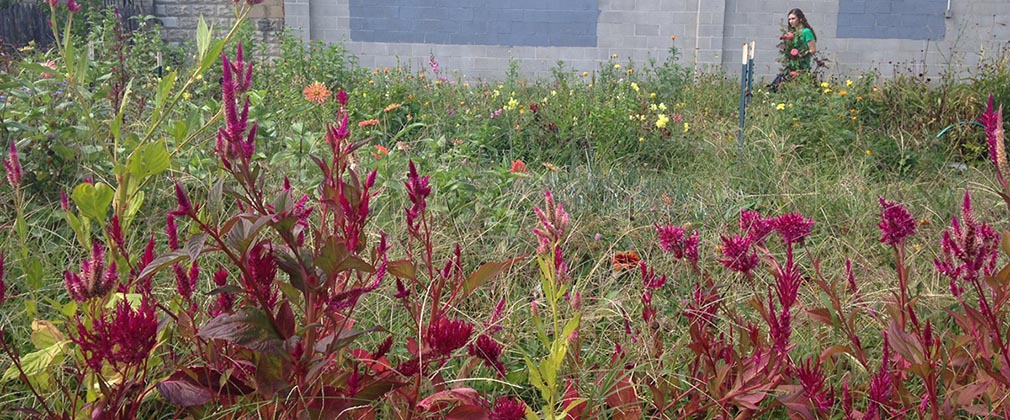Urban Farms and the Lawyers Who Help Them
In the renaissance that is urban agriculture, we’re seeing romantic stories pop up everywhere. There’s beekeeping on rooftops, neighborhood compost piles, and community gardens tilled by schoolchildren. There are open spaces with vegetable stands and horseshoe courts, and tucked-away farm lots in the heart of the city where Dominiques and Araucanas strut their stuff.
But there’s another side of urban agriculture that’s far more tedious than romantic—the legal side. As soon as the spade hits the soil, there are issues best addressed by an attorney. But farmers, don’t fret. Last Friday, the Community Law Center hosted the 2014 Urban Agriculture Law Conference at the University of Maryland Carey School of Law. The Johns Hopkins Center for a Livable Future, which has projects involving urban soil safety, urban foraging, aquaponics, food-and-farm mapping, and faith-based sustainability initiatives, was one of the event sponsors.
Farmers in the city face challenges that go well beyond soil quality and hornworms. There are practical problems to be solved: can a farmer tap into municipal water lines, and if so, where does the water bill get delivered, and who pays it? And there are myriad questions concerning property law: how to lease a vacant lot, whether it’s possible to get a property tax exemption, how to secure the lease long-term, whether to create a land trust, and so on. There are even liability issues, especially if products grown on the farm are sold to customers, or if the farm has beehives or chickens, or if there are people who work on the farm, either paid or volunteer. The savvy urban farmer needs to understand the varying—and sometimes competing—goals of any number of municipal agencies, from the tax department to the housing agency to the comptroller. Each agency has its own mission and its own concerns—and urban farmers, or the lawyers who help them, have to navigate each of them. Some city agencies might be reluctant to support an urban farm in a neighborhood targeted for rapid revitalization; a vacant lot-turned-farm might be considered a lost opportunity for revenue. And in neighborhoods that are not revitalizing quickly, there’s the question of gentrification: some agencies might worry that an urban farm will raise property values, which could lead to gentrification and push out low-income residents.
The Conference hosted nearly a dozen panels composed of farmers, lawyers, advocates, and employees of various Baltimore City agencies to help bring all these questions into the open and propose solutions for addressing them.
Miriam Avins, founder of Baltimore Green Space, explained her work creating land trusts and open spaces in the City. Joyce Smith, president of Operation ReachOut Southwest, explained her organization’s work to reduce health disparities in low-income neighborhoods. The Baltimore Office of Sustainability, which released its urban agriculture plan last November (2013), continues to refine policies and programs meant to “green” Baltimore, and representatives from that office spoke about the many types of regulations (animal husbandry and soil safety, for example) and how to navigate them, as well as local initiatives to make urban farming easier and more successful. Representatives from the Baltimore Housing Department were there and spoke about the Adopt-a-Lot program, which is intended to improve neighborhoods and provide water. Panelists included lawyers from American University, Georgetown University, the Lawyers Alliance for New York, the Public Interest Law Center of Philadelphia, Towson University, University of Detroit, University of Maryland, and other institutions. Members of several law clinics offered guidance on building partnerships with communities, as well.
Breaking up the panels was a Baltimore farm tour that took conference participants to Strength to Love Farm in Sandtown-Winchester, Hidden Harvest Farm in Station North, Hillen Homestead in Coldstream-Montebello, and Real Food Farm in Clifton Park.
With a maze of regulations, policies, programs, and resources, the paperwork required of urban gardeners and farmers can be dizzying. The Urban Agriculture Law Conference helped make some sense of the maze for those who are interested in taking on the challenge—and made it very clear how important our lawyer-friends will be in this process. As Gail Taylor of Three Part Harmony Farm in Washington, DC, said, “The 21st century farmer needs an in-house lawyer.”
The conference closed with a screening of Growing Cities, a documentary film that looks at the role of urban farming in America.
More Stories and Viewpoints
Who Do Americans Trust for Nutrition Advice?
Who do Americans trust to give them nutrition advice? Patti Truant Anderson weighs in on the federal government’s new dietary guidelines.
Food Trends for 2025 Focus on Healthful Foods, Viral Trends, and Protein
In 2025, food trends are being driven in part by social media trends, and many Americans plan to start new eating patterns.
A Victory for Oklahoma in Poultry Pollution Case
A federal judge has ordered 11 poultry companies in Oklahoma to remediate the watershed and limit their spreading of manure on crops.
